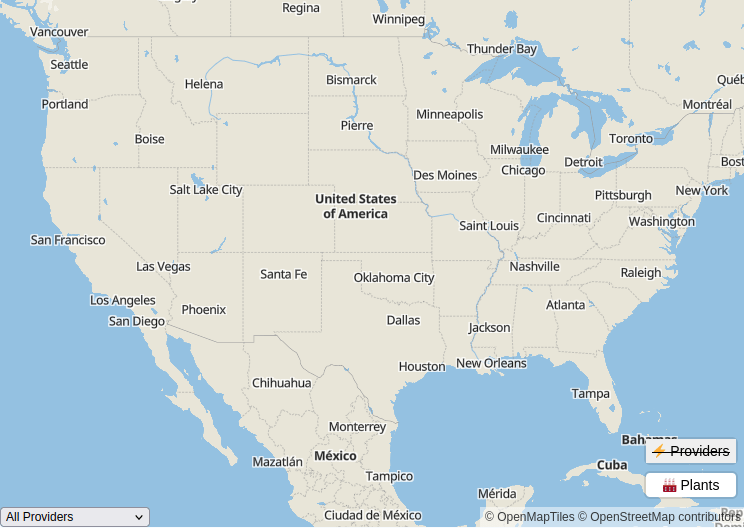McDuffie County, Georgia Electricity Rates & Statistics
Electricity Rates, Plans & Statistics
High Power Bills?
Reduce or replace your electricity bill with solar
McDuffie County, Georgia Electricity Overview
During the course of the past year, McDuffie County saw a 3.25% decline in CO2 emissions per capita.
No electricity generation takes place in McDuffie County, resulting in the county needing to import their electricity from outside of their borders.
Citizens of McDuffie County use enough electricity to release 4,516.3 kilograms of CO2 gases per person, which is the 1577th highest amount of pollution from electricity consumption for a county in the nation.
Releasing 98,125,629.15 kilograms of CO2 gases, McDuffie County has the 1766th highest pollution level due to electricity use out of 3230 counties in the US.
With a population of 21,727 residents, McDuffie County is the 84th largest county in the state and the 1796th largest in the United States.
The US national average residential rate per kilowatt hour sits at 16.01 cents, while residents of McDuffie County benefit from an average rate that is 13.12% less at 13.91 cents per kilowatt hour.
ENERGY CONSUMPTION
Total Consumption
283,333 MWh
Consumption per Capita
13.04 MWh
EMISSIONS
CO2 Emissions
98,125,629 kg
CO2 Emissions per Capita
4,516.3 kg
Thomson, GA Electricity Overview

On average, residents living within Thomson are billed a residential electricity rate of 14.59 cents per kilowatt hour, which is 6.79% above the state's average rate of 13.66 cents. This makes the city 478th lowest for average electricity rate out of 675 cities in Georgia. With an estimated 228 residential customers, Georgia Power is the largest electricity supplier in the city. The city is faced with an average of 1 power outages per customer per year. These outages go on for an average of 133.1 minutes. In contrast, the US average is 1.27 outages per consumer and 137.24 minutes per outage.
Thomson emits 4,516.3 kilograms of CO2 pollution per capita due to electricity consumption, which makes it the 13th worst polluting city out of 675 cities in the state based on emissions per capita. This comes to a total pollution amount of 31,126,332.95 kilograms of CO2 emissions. Electricity companies servicing Thomson must turn to power produced in nearby cities and rural areas, since no power production takes place in the city boundaries.
Average Residential Electricity Bills & Rates in Thomson
Thomson residential electric rates are highest in January and the highest average bill is in February.
Historical Electricity Rates:
Electric Companies With Service in Thomson, Georgia
| Provider | Service Type | Residential Rate (¢) | Residential Average Bill ($) | City Production (MWh) | Residential Sales (MWh) | Residential Revenues ($) |
|---|---|---|---|---|---|---|
| Georgia Power | BUNDLED | 14.59 | 143.31 | 28,176,767.13 | 4,111,871,490 |
Sign up for our newsletter, Watts Up in Energy, to receive updates on the latest energy news.
Dearing, GA Electricity Overview

On average, residents living within Dearing are billed a residential electricity rate of 14.59 cents per kilowatt hour, which is 6.79% above the state's average rate of 13.66 cents. This makes the city 478th lowest for average electricity rate out of 675 cities in Georgia. Dearing is home to 622 residents, resulting in it being the 462nd most populated city in the state. The city is faced with an average of 1 power outages per customer each year. These outages go on for an average of 133.1 minutes. In contrast, the nationwide average is 1.27 outages per consumer and 137.24 minutes each outage.
Dearing emits 4,516.3 kilograms of CO2 pollution per capita due to electricity consumption, which makes it the 145th worst polluting city out of 675 cities in the state based on emissions per capita. This comes to a total pollution amount of 2,809,138 kilograms of CO2 emissions. Electricity companies servicing Dearing must turn to power produced in nearby cities and rural areas, since no power production takes place in the city boundaries.
Average Residential Electricity Bills & Rates in Dearing
Dearing residential electric rates are highest in January and the highest average bill is in February.
Historical Electricity Rates:
Electric Companies With Service in Dearing, Georgia
| Provider | Service Type | Residential Rate (¢) | Residential Average Bill ($) | City Production (MWh) | Residential Sales (MWh) | Residential Revenues ($) |
|---|---|---|---|---|---|---|
| Georgia Power | BUNDLED | 14.59 | 143.31 | 28,176,767.13 | 4,111,871,490 |
Go Solar for less than your cell phone bill.
McDuffie County, Georgia Details
FAQ
What electricity companies offer service in McDuffie County, Georgia?
| County Customers Rank | Provider | Est. County Customers |
|---|---|---|
| 1 | Georgia Power | 12,648 |
| 2 | Jefferson Energy Cooperative | 4,525 |
What electricity company is the largest supplier in McDuffie County, Georgia?
The largest electricity company in McDuffie County, Georgia by megawatt hours sold is Georgia Power.
How many electric companies offer service in McDuffie County, Georgia?
There are 2 electricity suppliers operating in McDuffie County, Georgia.